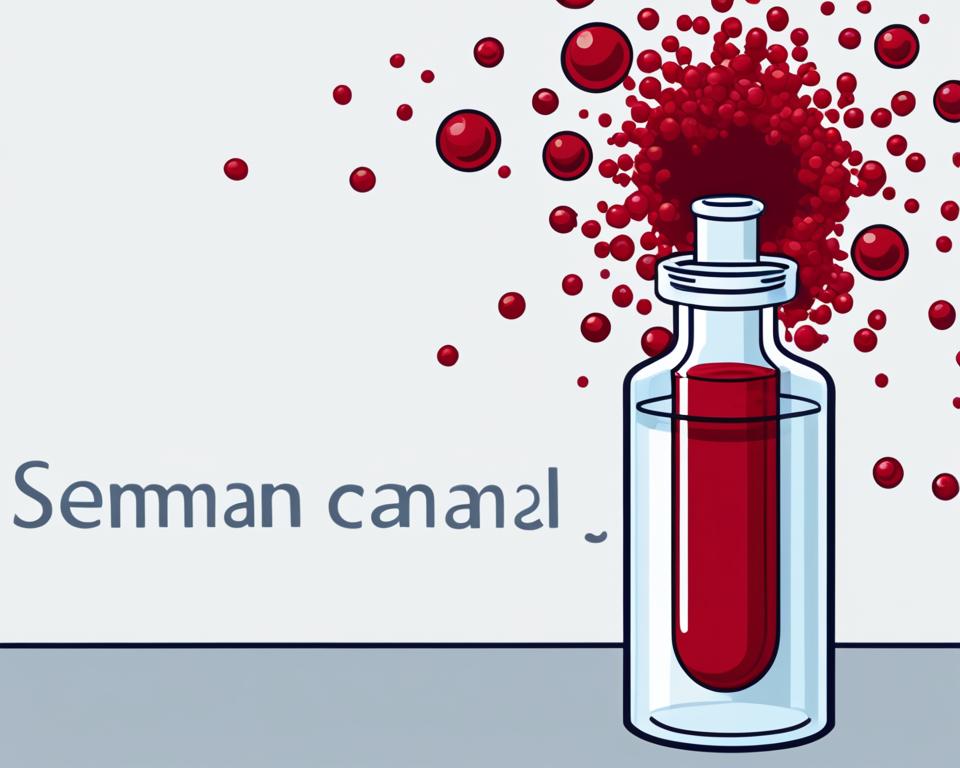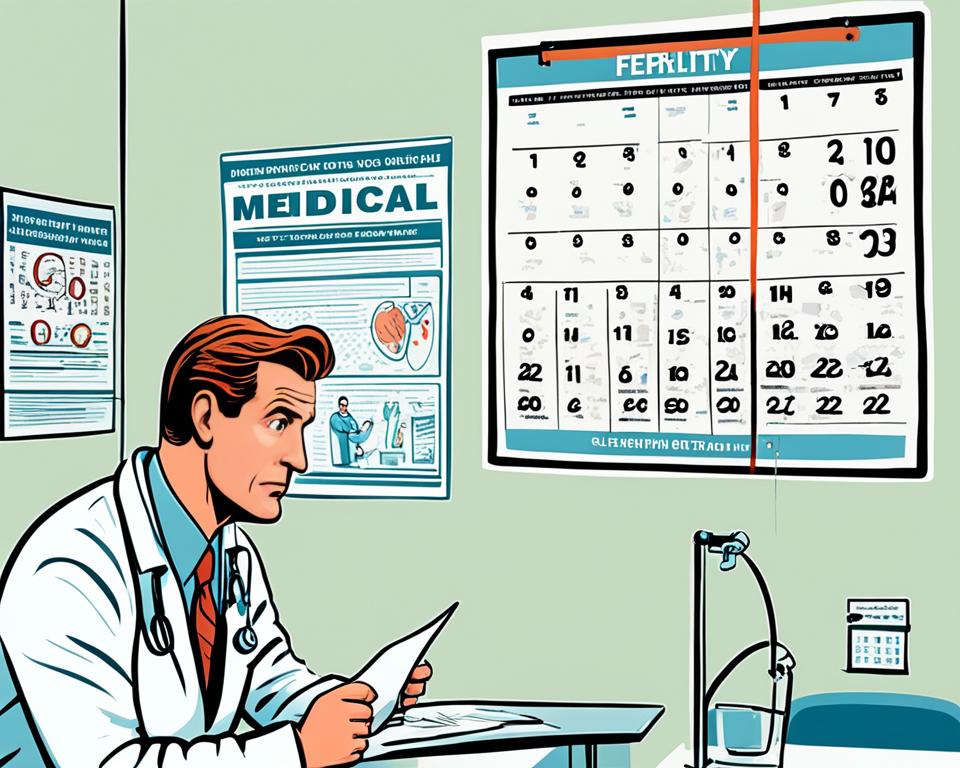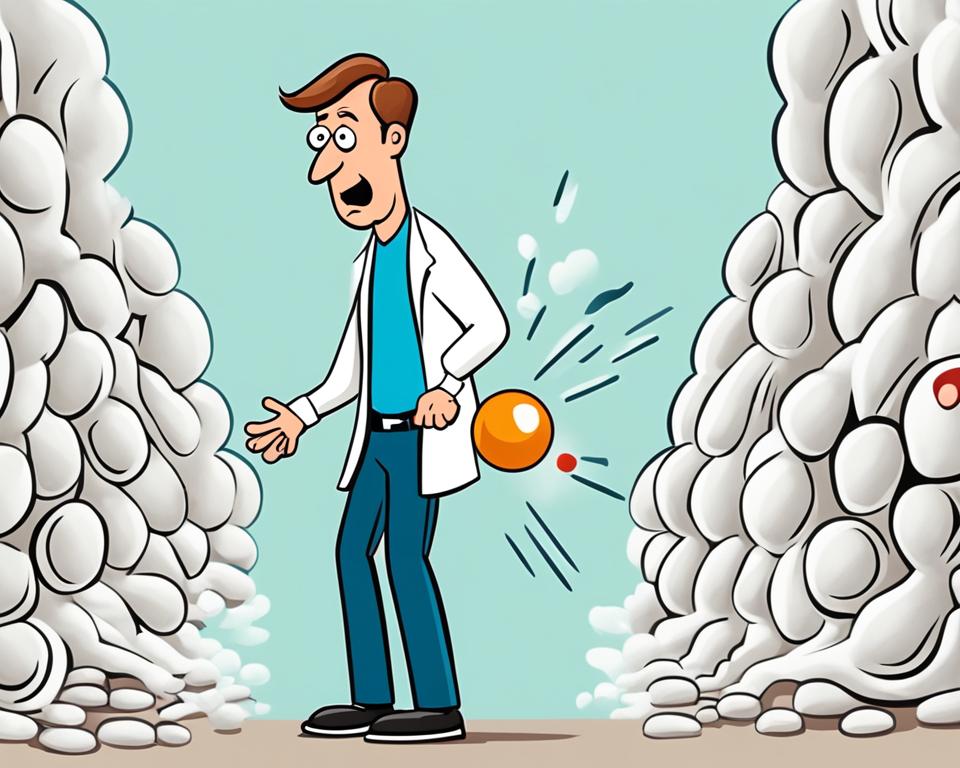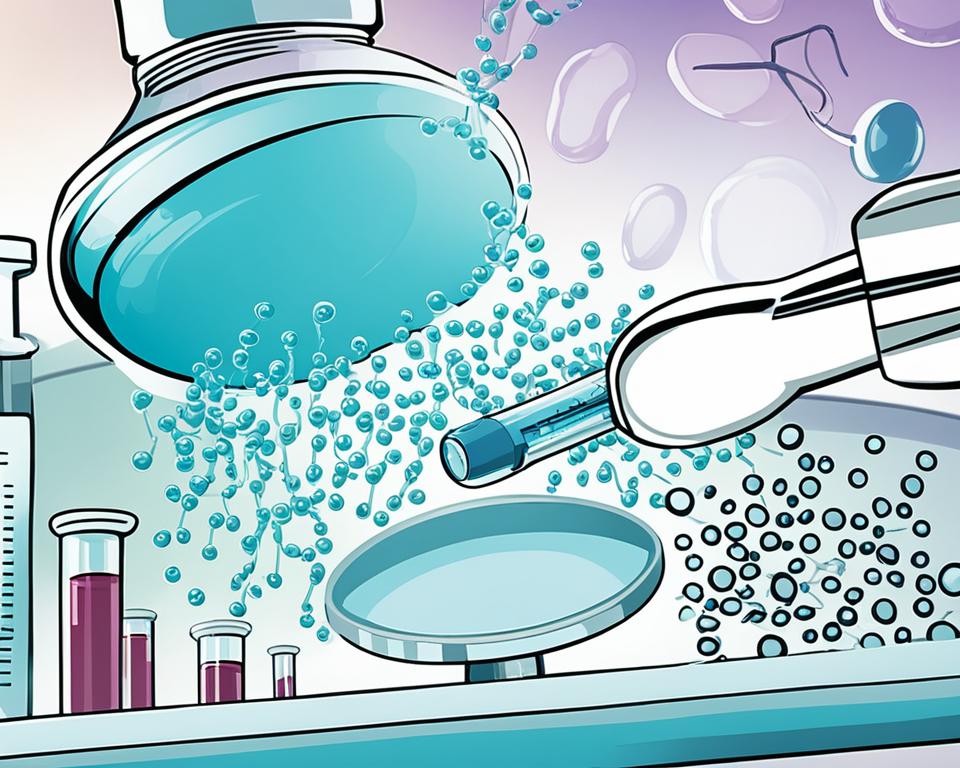Welcome! Let’s dive into the world of male infertility together. We’ll look at its causes, how it’s diagnosed, and ways to treat it. This condition affects many men around the world. If you’re looking to learn about the risks or need help, you’re in the right place.
Male infertility can be tough, but don’t worry. With the right info and support, you can find solutions. So, we’re here to help you understand male infertility better. Let’s begin this important journey together.
Key Takeaways:
- Male infertility is a common issue that can affect a man’s ability to have a baby.
- Knowing the causes and risks is key to finding the right diagnosis and treatment.
- A specialist in male infertility can offer the best care and custom treatments.
- There are many tests to find out the reason for male infertility and other related problems.
- Thanks to medical progress, there are many treatments, like medicine, surgery, and ART, that can help.
Signs and Symptoms of Ejaculation Problems
Ejaculation problems can really ruin your day, especially if you’re trying to have a baby. Knowing the signs is key for getting help early. We’ll explain them to you, so keep reading!
1. Dry Orgasm
Have you ever experienced a dry orgasm? It’s not about lacking water on a sea trip. It’s when you feel the orgasm but nothing comes out. It feels like a trick that didn’t work out.
2. Low Semen Volume
When making a baby, more semen usually means better chances. If you see less semen than usual, it might mean fertility issues. But remember, it only takes one sperm to win the race.
3. Ouch! Pain during Ejaculation
Pain at the moment of climax isn’t good. It means something could be wrong. Best to have a doctor check it.
4. Blood in Semen
Finding blood in your semen can scare anyone. It’s not something you should ignore. It means you need to see a doctor fast.
Don’t ignore these signs of trouble. They could mean it’s time to get some medical advice. It’s better to talk about it than to worry alone.

If you’re facing any of these problems, talking to a doctor is crucial. They can figure out what’s wrong and how to fix it. It’s important to ask for help and follow their advice for your health.
When to Seek Help for Male Infertility
If you’re worried about fertility, it’s important to know when to get help. You should see a doctor if you have dry orgasms or not much semen. Also, if it hurts when you ejaculate or if there’s blood in your semen.
An infertility specialist knows a lot about these problems. They can help you find out what’s wrong. They can also talk about ways to fix the problem.
If trying for a baby hasn’t worked for a year, see a specialist. They will check for any issues. And they’ll guide you on what to do next.
Also, if any surgeries you’ve had might affect having a baby, get help. Or if you have a health problem that makes it hard to have a baby. An expert can check how these affect your odds of having a family.
Getting help for male infertility shows you’re taking action. With the right help, you can work through fertility problems. This can improve your chances of growing your family.
Don’t wait, take the first step towards parenthood today!
Talk to an infertility expert. They can offer advice just for you. And they can help you face any challenges on your way to being a parent.
| Surgeries Affecting Fertility | Health Conditions Affecting Fertility |
|---|---|
| Groin surgery | Diabetes |
| Prostate surgery | Thyroid disorders |
| Hernia repair | Hypogonadism |
| Testicular surgery | Klinefelter syndrome |
If you’ve had any surgeries like these, talk to a specialist. Or if you have health issues listed here. They can discuss how it might affect having a baby. And they can talk about ways to help.
If you dream of having a family, don’t let fertility problems stop you. A specialist can help you manage your fertility journey. Start today!

Causes of Ejaculation Issues in Men
Many factors can cause ejaculation problems in men. Each affects reproductive health differently. Knowing these causes helps treat and manage them. Let’s look at some common reasons:
Retrograde Ejaculation
Retrograde ejaculation means semen goes back into the bladder, not out the penis. This can make a man infertile because sperm can’t reach the female system. Diabetes, certain meds, or surgery on the prostate or bladder might cause it.
Diabetes and Ejaculation
Uncontrolled diabetes can hurt your sex life, including ejaculation. High sugar levels can damage nerves and vessels, reducing sensation and making ejaculation hard. Controlling blood sugar may improve these problems and sexual health.
Spinal Cord Injuries and Ejaculation
Spinal cord injuries can mess up the nerves controlling ejaculation. The impact depends on the injury’s location and severity. Rehab programs and medical help can assist men with these injuries. They aim to manage ejaculation problems and better life quality.
Surgeries Affecting Ejaculation
Surgery on the reproductive system, like prostate or bladder operations, can affect ejaculation. It might lead to scarring, nerve damage, or changes in structure. Always talk about potential risks and side effects with your doctor before surgery.
Dysautonomia and Ejaculation
Dysautonomia impacts automatic body functions, including sexual reaction. This can lead to ejaculation issues like delay, being too quick, or trouble reaching orgasm. Treating dysautonomia and consulting with doctors can help solve these problems.
“Understanding the underlying causes is crucial for effective management and treatment.”
Finding and tackling the root causes of ejaculation issues helps find good treatments. This lets individuals regain their reproductive health.
| Cause | Symptoms |
|---|---|
| Retrograde Ejaculation | No semen during ejaculation, cloudy urine after ejaculation |
| Diabetes | Reduced sensation, delayed ejaculation |
| Spinal Cord Injuries | Diminished or absent ejaculation |
| Surgeries | Anatomical changes, scarring, nerve damage |
| Dysautonomia | Delayed ejaculation, premature ejaculation, difficulty achieving orgasm |
Seeing a doctor who knows about male reproductive health is key. They can find why you have ejaculation issues and make a treatment plan.

Diagnosis and Management of Male Infertility
Doctors start diagnosing male infertility by looking at the person’s health history. They check if past health issues, surgeries, or medicines might cause infertility. This helps in making a right diagnosis and treatment plan.
In a physical exam, the doctor checks the person’s reproductive system and overall health. This helps find any problems that could affect fertility, like varicoceles. The exam also checks hormone levels and general health.
Laboratory tests are key for diagnosing male infertility. A common test is checking the semen, which looks at sperm quality, count, and movement. This test and others help find the reason for infertility. They can check for hormone issues, genetic problems, or infections too.
After diagnosing, doctors make a personalized plan for treatment. This can include medicine, surgery, or assisted reproductive techniques (ART). Medicine can balance hormones or boost sperm production. Surgery can fix problems like varicoceles or blocked tubes.
ART methods help with pregnancy. One method is in vitro fertilization (IVF), where an egg is fertilized outside the body. Then, the embryo is put into the uterus. Another way is intrauterine insemination (IUI). This puts sperm directly into the uterus to help with fertilization.
“Diagnosing male infertility requires a comprehensive assessment of medical history, physical examination, and laboratory tests. Armed with this knowledge, healthcare professionals can develop personalized management plans that may include medication, surgery, or assisted reproductive techniques.”
Today, there are many treatments for male infertility. It’s important to see a specialist to get the right diagnosis and treatment. By dealing with the causes and finding good treatments, couples have a better chance of having a baby.
Management Options for Male Infertility
| Management Option | Description |
|---|---|
| Medication | Prescription drugs that address hormonal imbalances or enhance sperm production |
| Surgery | Corrective procedures to address structural abnormalities or blockages |
| Assisted Reproductive Techniques (ART) | Advanced procedures such as in vitro fertilization (IVF) or intrauterine insemination (IUI) to assist in achieving pregnancy |

Conclusion
Male infertility is a serious issue, but there are solutions. Couples can face this and take charge of their fertility. When things seem hard, remember you’re not alone. Get help from doctors who know about male infertility. They can help you with tests and treatments.
Dealing with fertility issues can be hard emotionally. Yet, staying positive and knowing a lot helps a lot. Learn about why male infertility happens and look at your choices. There are many ways to help, like medicine, surgery, or other methods. These can aid you and your partner in becoming parents.
Fertility problems don’t define you or your manhood. They’re just something some couples go through. Stay hopeful and keep looking for ways to move forward. Be determined, resilient, and find good support. Doing this can help make your dream of a family come true.

